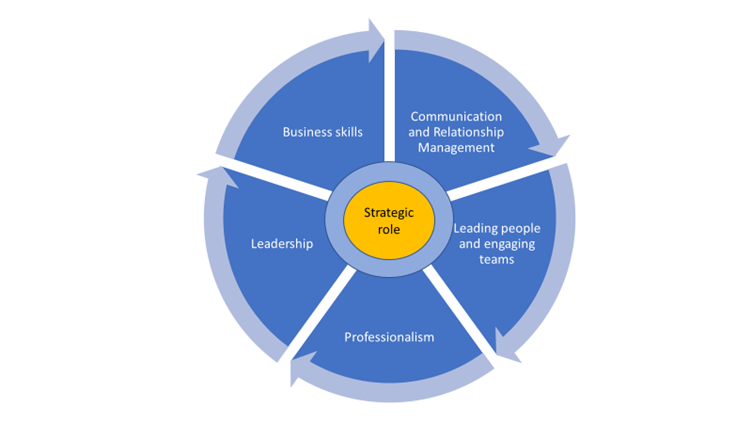Health and social care professionals take care of health and wellbeing of individuals and families. The corona pandemic has changed the circumstances, and now demands more from these professionals than for many decades. Especially as the most vulnerable client groups are at greater risk. Health and social care professionals are adapting to the changed workload and working environment. With these extraordinary demands, leadership competencies have a crucial role in developing professionals in health and social care among other essential services to work in new environments with different roles. Particularly as many service models are modified into digital.
A leadership competency framework guiding competence development
The DOCMAN project has developed a leadership competence framework for health and social care (Figure 1.), but the pandemic forces us to reflect leadership competencies from a different perspective. All competency areas are essential, but it is vital to emphasize the strategic role of leaders.

In crisis management, like corona pandemic, leaders are strategic actors: they create strategies to overcome the crisis and communicate them clearly. Leaders are forced to focus on adaptive competencies crucial for all employees, leaders and professionals. Like Beer et al. (2015) state, learning and developing leadership competencies is essential to make leaders and their organization more effective for the benefit of clients and society.
Corona crisis is a learning platform for the future leadership competencies
The pandemic is a learning platform for the future. In crisis management, it is important to identify leaders as part of an organizational system with interacting elements. Different roles, responsibilities, organizational structure, and organizational culture all drive organizational behaviours and that way organizational performance (Beer et al. 2015). This means that leaders are not able to implement a change by themselves, and this needs to be highlighted during the corona pandemic. In facilitating the change, a leadership competency framework provides a model to study and reflect on one’s competencies during and after the crisis. In addition, subordinates’ experience on how these certain competencies were seen in health and social care practice is needed.
Giles (2016) groups the most important leadership competencies into five major themes: strong ethics and safety, self-organizing, efficient learning, nurturing growth, and fostering connection and belonging. Strong ethics and safety include high ethical standards providing a sense of safety. Self-organizing is facilitated to followers by objectives and clearly communicated expectations. Effective learning creates flexibility to change, shows openness to new ideas and fosters organizational learning. Nurturing growth is being committed to ongoing training and inspiring the best from subordinates and teams. None of the competencies Giles presents are easy to teach or learn. I would say they emphasize ‘soft values’: when soft values are taking care of, the hard values, organizational success and profit, tend to follow. Still, these competencies do not mention authority and strict orders and obedience to authorities, which are required in crisis management in health and social care organizations. It is important to remember, that there is no perfect leadership model for every crisis. Still, different frameworks help leaders and researchers to define good practices.
Author
Päivi Huotari, Principal Lecturer at LAB University of Applied Sciences. She is the project manager of the Erasmus+ DOCMAN project at LAB UAS. The project aims to develop and strengthen health and social care leadership competencies in cooperation with four European universities.
References
Beer, M., Finnström, M., & Schrader, D. 2016. Why leadership training fails—and what to do about it. Harvard Business Review, 94(10), 50-57.
Giles, S. 2016. The most important leadership competencies, according to leaders around the world. Harvard Business Review, 15.
Links
LAB. 2020. DOCMAN2 – Development of competencies and Modules to Enhance Advanced Practice across Europe for Health and Social Care Management Masters Students. [Accessed 19.10.2020]. Accessible at: https://lab.fi/fi/projekti/docman2-development-competencies-and-modules-enhance-advanced-practice-across-europe




